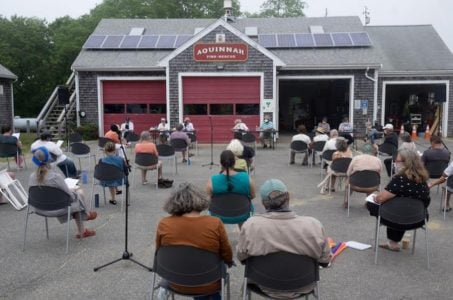Martha’s Vineyard Tribal Gambling Hall Delayed by Disputed Electrical Permit, New Court Proceedings
Posted on: May 6, 2019, 08:56h.
Last updated on: May 6, 2019, 08:56h.
A planned bingo venue on Massachusetts’ Martha’s Vineyard is once again the subject of court battles with new charges also being exchanged about the town of Aquinnah denying an electrical permit to the Wampanoag Tribe of Gay Head.

A hearing over the dispute is supposed to take place later this month. But for now, it appears construction of the casino on the upscale island has been temporarily halted.
In March, electricity to the construction site was shut off. It apparently stems from workers installing wire service on the property before a legal permit could be issued.
A town inspector could not get access to the property to do the necessary inspection. The tribe may prefer to use its own inspector.
“The tribe has been deprived of electricity to continue construction, which is integral to the tribe being able to offer gaming on its Indian lands,” according to a tribal statement that was quoted by the Martha Vineyard Gazette.
In response, Aquinnah Town Administrator Jeffrey Madison told Casino.org he has “no idea” if construction” on the casino came to a stop.
“The town recognizes/supports the tribe’s right to conduct gaming on its settlement lands. That issue is settled,” Madison said.
The town’s only concerns involve public safety, environmental impact and anticipated use of municipal services. There has been absolutely no information from the tribe concerning these matters or any other planned elements of the planned development.”
Madison, who is an attorney, is also concerned about the way the judicial process is being handled more broadly during the presidency of Donald Trump.
“We are hopeful that despite the flagrant disregard for the American judicial system by Trump and his puppets, there remains enough resolve within the system to act as an arbiter of the impasse that seems to be perpetuated by the tribe,” Madison said.
Last month, attorneys for the town asked a federal judge if the tribe needs to obtain a town building permit before beginning construction.
A hearing on the latest controversy is scheduled for May 20 with Boston federal court Judge F. Dennis Saylor IV presiding.
Property Cleared
The casino was previously challenged in federal court, but the U.S. Supreme Court chose not to hear an appeal. The tribe declared victory and began clearing the property in February.
Plans call for a 10,000-square-foot gambling venue that will feature 250 electronic games. The site will also include food trucks for casino patrons.
The tribe predicts the venue will generate about $4.5 million annually in revenue, and it is tentatively being called the Aquinnah Cliffs Casino.
It will be a Class I and II casino under the Indian Gaming Regulatory Act — meaning traditional slot machines and table games won’t be permitted. For the tribe to offer slots and tables, it would need to enter a gaming compact with the state.
Legal Restrictions on Gaming Hall
In a March 28 letter, Attorney Douglas J. Kline, who works in the Boston office of Goodwin, which is now representing the town, says he is “troubled” over the tribe’s actions, and questions if the tribe can operate a gaming venue on the property given restrictions under federal law.
He contends a tribe can only operate a Class II gaming venue if land was taken into trust before October 1988 — with limited exceptions. “None of the exceptions appear applicable,” he said.
The tribe purchased 17 acres divided among separate parcels, for $1.1 million, in 2014, and about 15 of the acres were taken into trust by the federal government in 2018. Also, Klein points out in the correspondence the tribe does not possess a formally recognized “Indian reservation,” according to the Martha’s Vineyard Times.
Kline told the tribe to stop any construction on the project. Once resumed, construction of the gambling hall is expected to take six months to complete.
The bingo hall is located on the island’s remote western end, and residents have worried about its impact on the bucolic location.
Related News Articles
Most Popular
Genovese Capo Sentenced for Illegal Gambling on Long Island
VEGAS MYTHS RE-BUSTED: The Strip is the Brightest Place on Earth
UPDATE: Former Resorts World & MGM Grand Prez Loses Gaming License
Jackpot News Roundup: Two Major Holiday Wins at California’s Sky River Casino
VEGAS MYTHS RE-BUSTED: The Traveling Welcome to Las Vegas Sign
Most Commented
-
UPDATE: Whiskey Pete’s Casino Near Las Vegas Closes
— December 20, 2024 — 33 Comments -
Zillow: Town Outside Las Vegas Named the Most Popular Retirement City in 2024
— December 26, 2024 — 18 Comments -
Caesars Virginia in Danville Now Accepting Hotel Room Reservations
— November 27, 2024 — 9 Comments -
UPDATE: Former Resorts World & MGM Grand Prez Loses Gaming License
— December 19, 2024 — 8 Comments
















No comments yet